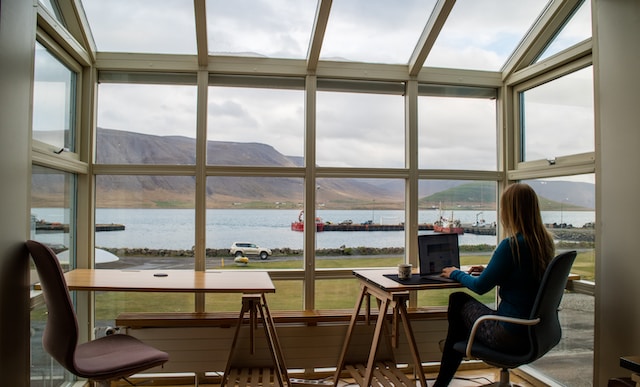You’ve ogled the scenery. You’ve drooled over tasty-looking dishes. You’ve heard the people are warm and friendly. You’ve researched traveler safety in the area. Now you’re ready to head out on an awesome adventure! But wait: Have you thought about keeping your personal information safe online while you’re traveling? While you’re traveling, you may be using unsecured WiFi connections, carrying personal documents, buying things from street vendors, and withdrawing money from ATMs.
Most of us can’t go anywhere these days without our smartphones or other mobile devices. And this technology helps us get where we’re going, stay connected to home and office, post to our social media accounts, and so much more. This also gives hackers plenty of opportunity to see and steal our personal data.
So before you go, spend some time thinking about password management, safe browsing, and data privacy. The following travel tips will help you reduce the risk of having your information compromised online so you can relax and enjoy your trip.
Tips for planning your trip safely
While countries, states, and territories have boundaries, the Internet does not. That’s why you can purchase goods and services online no matter where they originate. Despite this global capability, there is no international law governing data privacy.
Instead, certain countries or regions have laws on how to collect, use and store your data. The most well-known examples of privacy laws include the EU General Data Protection Regulation (GDPR), EU ePrivacy Directive, California Consumer Privacy Act (CCPA), California Online Privacy Protection Act (CalOPPA), and the Personal Information Protection and Electronic Documents Act of Canada (PIPEDA).
These laws have some international application as consumers in other countries who purchase goods or services from a covered country, state, or territory are protected by them. And conversely, countries that sell goods or services to consumers in the covered areas must comply with them.
But what about the internet and technology infrastructure where you’re going? That’s where your research comes in. An online search will help you understand whether the place has well-established internet services and a strong infrastructure you can rely on.
Secure internet service is also vital for your transportation and accommodations. One of the questions you should ask your hotel or other lodging is whether they have a secure internet connection. Internet security is critical because it prevents cybercriminals from accessing valuable data and sensitive information. When hackers get this data, they can cause a variety of problems, including identity theft, stolen assets, and reputational harm.
Public WiFi networks, or hotspots, in coffee shops, malls, airports, hotels, and other places are convenient. In the early days of the internet, they often weren’t secure. But things have changed.
In the past, if you used a public WiFi network to get online, your information was at risk. That’s because most websites don’t use encryption to scramble the data and protect it from hackers. Today, most websites use encryption to protect your information and provide safe browsing. Because of the widespread use of encryption, connecting through a public WiFi network is usually safe. But how do you know for sure? Look for a lock symbol or HTTPS (not just HTTP) in the address bar to the left of the website address to know the site is encrypted and you are safe.

When traveling, we usually think about the must-have apps to make our trip easier. But what do you do if the public WiFi you want to use is not encrypted? Utilize a virtual private network (VPN) on your devices. VPNs encrypt your internet traffic and disguise your online identity. This makes it more difficult for third parties to track your activities online and steal data.
Switching on a VPN creates an encrypted connection (sometimes called a tunnel) between your device and a remote server operated by the VPN service. All your internet traffic is routed through this tunnel to the server, which then sends it off to the public internet. Data coming back to your device makes the same trip from the internet to the VPN server, through the encrypted connection, and back to your device. Some of the top-rated VPNs include:
- NORD
- SurfShark
- Proton
- Private Internet Access
- Tunnel Bear
You can also secure your text messages by using an encrypted messenger service. These services work the same way as VPN, providing end-to-end privacy for your chats. Some of the most popular applications for encrypting your texts include iMessage (which comes on your iPhone) and What’s App, a free download. Other highly rated secure messenger apps include:
- Signal
- Viber
- Wickr
- Wire
- Threema
- Telegram
- Pryvate
- Line
You’re right — adding a VPN and a secure messenger app gives you two more passwords to remember. But never fear — there’s an app for that! A password manager is an app on your phone, tablet, or computer that stores your passwords so you don’t have to remember them. Once you’ve logged into the password manager using a master password, it will generate and remember your passwords for all your online accounts.
Mobile antivirus software is the last thing to consider that will help you with safe browsing. As an app, this software prevents virus and malware attacks on your mobile devices. A quick internet search turns up a variety of top 10 lists for effective apps.
Securing your home while traveling with home security systems
Ensuring the safety of your home while you embark on your travel adventure is as crucial as safeguarding your online presence. Home security systems can provide peace of mind, allowing you to fully enjoy your trip without worrying about the well-being of your residence.
1. Smart Home Security Systems:
Investing in a smart home security system can be a game-changer. These systems often include features such as surveillance cameras, motion detectors, door/window sensors, and remote access through a smartphone app. Before leaving, ensure that all components are in working order and properly connected.
2. Smart Lighting:
Smart lighting systems can create the illusion of an occupied home, deterring potential intruders. Timers and remote control capabilities allow you to schedule lights to turn on and off, giving the impression that someone is present.
3. Home Automation:
Consider home automation systems that enable you to control various aspects remotely. This includes smart locks, which allow you to monitor and secure entry points from your smartphone. Ensure all doors and windows are locked before departure.
4. Security Cameras:
Strategically placed security cameras can act as a deterrent and provide real-time monitoring. Choose high-quality cameras with features like motion detection and night vision. Some systems even allow you to receive alerts and view live feeds on your mobile device.
5. Home Alarm Systems:
Install a reliable home alarm system that triggers loud alarms in case of unauthorized entry. Display signs indicating the presence of an alarm system; this alone can discourage potential intruders.
Digital devices that will help on your trip

Now that we’ve talked about safe browsing, data privacy, and password management, let’s look at devices that can help in other ways while traveling.
GPS trackers for luggage
A luggage tracker is a small device that goes inside checked baggage and utilizes GPS, Bluetooth, or WiFi technology to communicate its location. A luggage tracker can give you peace of mind if you’re concerned by the rise in reports of mishandled luggage or just want to keep tabs on your things.
Portable charger and travel adaptor
There’s a better option if you’re packing multiple chargers for your devices. A single multiport charger can quickly charge all your devices at the same time and is close to the size of the charger you get with a tablet. It will also help you avoid public charging stations when used with a travel adaptor.
Travel adaptors will allow you to plug that charger in no matter where you are or what the plugs in that location look like. Travel adaptors are a must for international travel.
Portable WiFi hotspot or eSIM
If you want to stay connected and avoid using public WiFi altogether, consider purchasing a portable WiFi hotspot. A mobile hotspot device is like a personal, portable router you can use to connect to the internet.
An eSIM is a digital version of the physical SIM card—identifying your device virtually to provide a network connection. eSIMs are used in tablets, smartwatches, drones, and even cars. They’re basically space-saving game-changers for connectivity.
Smart luggage lock
Smart locks for luggage let you use your smartphone or a different smart device as a key, eliminating the need to carry around a metal key and worry about it getting lost or stolen.
Safe online behavior while traveling

There are some other things you can do to make sure your online behavior is as safe as possible while traveling, like the following:
- Avoid using unencrypted public WiFi: Now you know how to tell if public WiFi is encrypted — by looking for the lock symbol or HTTPS in the address bar — so never use an unencrypted public WiFi hotspot. If you have hotspot capability on your phone or you’ve purchased a portable WiFi device, you never have to expose yourself to the risk of unencrypted public WiFi.
- Use two-factor authentication: Two-factor authentication is essential to web security because it immediately neutralizes the risks associated with compromised passwords. If a password is hacked, guessed, or even phished, that’s no longer enough to give an intruder access: without approval at the second factor, a password alone is useless.
- Be cautious of phishing attacks: Phishing is a type of attack used to steal user data, including login credentials and credit card numbers. It happens when an attacker pretends to be a trusted entity and gets a victim to open an email, instant message, or text message. The recipient is then tricked into clicking a malicious link. This can lead to malware being installed, the system freezing as part of a ransomware attack, or sensitive information being revealed.
- Don’t share everything on social media: For general safety, it’s good not to let everyone in the world know you’re traveling. It’s an invitation for those with malicious intent to target your home while you’re not there. If your accounts are public, you’re also allowing people you don’t know to see where you are and what you’re doing, which could lead to you being targeted while you’re away.
- Avoid public charging stations by bringing your own charger and adaptor: Cybersecurity experts warn that bad actors can load malware onto public USB charging stations to maliciously access electronic devices while they are being charged. Malware installed through a corrupted USB port can lock a device or export personal data and passwords directly to the perpetrator.
- When traveling, it’s important to stay vigilant for vishing attacks, where sophisticated scammers may use voice cloning technology and caller ID spoofing to impersonate trusted entities, such as banks, leading to financial and reputational harm—as they trick you into divulging sensitive information over the phone, a tactic that has seen a 550% increase in cases from 2021 to 2022.
Protecting your financial information
One of the worst outcomes of hackers getting your personal data is losing your financial information. Follow these suggestions to keep your money safe while you’re on the road:
- Use a credit card instead of a debit card to make your purchases: In this way, you can avoid the risk of inputting your personal identification number (PIN) in a place where someone might see it.
- Inform your bank of your travel plans: This will avoid having your account frozen while you’re traveling when the bank sees purchases from unusual places. It will also help your bank keep an eye out for any suspicious activity and contact you to verify purchases or expenses you charge.
- Be vigilant when logging in or using your PIN: Be aware of your surroundings and cover the pin pad if you make a withdrawal at an ATM or if you log into your bank account in public.
- Don’t keep all your money in one place. Use a money belt or hidden wallet, but don’t put all your cash there. Separate your money into different pockets so that if someone does get access to your cash, you won’t lose it all.
- Take a picture of your credit card information: If you lose your card or if it gets stolen, this will help you report it to your bank right away so they can put a stop to it and issue a new card.
And again, there is no international law on cyber security, so it’s important to know what, if any, laws are relevant to where you’re traveling. The last thing you want is to violate the law in unfamiliar surroundings.
Physical safety while traveling

It’s also important to keep your belongings safe while you travel, especially if you are headed to multiple destinations. One main thing you can do is minimize. Losing your luggage is difficult if you only have one carry-on bag. Don’t carry devices you don’t really need. You can do so much on a smartphone now, so ask yourself if you really need that tablet or laptop.
As previously discussed, it’s wise to use a luggage locator and a smart lock so you can be as secure as possible, even at your accommodations. And keep track of your things while you’re on the move. Of course, the more you have with you, the more you have to worry about.
Don’t leave your devices in your room or wherever you’re staying — always keep them with you. If you must bring them with you and leave them behind while you’re out, lock them in a safe along with your essential travel documents. And be sure not to leave your devices unattended when you’re out and about. Nothing can kill your good time faster than losing your phone or other device.
Be vigilant about your surroundings. This doesn’t mean you must always be on high alert. It simply means you need to practice situational awareness. Situational awareness is knowing where you are and what is happening around you, allowing you to be more alert and informed and make better decisions.
If you’re traveling to a destination subject to natural disasters, be ready for an emergency by learning about local warning systems, evacuation routes, and shelters. Designate an emergency contact at home and share travel plans, important documents, and travel information. If you’re traveling with family, identify a safe place to meet if you become separated.
Conclusion
Whether traveling for a business trip or an incredible adventure, keeping yourself safe online must be a priority. We’ve discussed data privacy, password management, safe browsing, and travel safety, all of which are essential elements in providing yourself with the security you need to let go and enjoy. If you prioritize setting up some of the systems we’ve discussed, you’ll have much less worry while you’re gone. That’s because you now understand the risks and have taken, and will continue to take, steps to minimize them. And these steps lead to stepping out on the road ahead, where you can safely stay connected (if you want to) while you take in the scenery, eat that delicious food, and party with those friendly locals. Bon Voyage!




